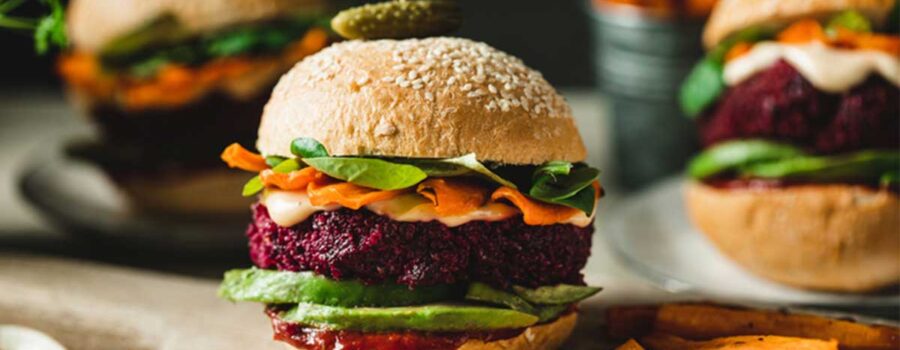If you have been curious about plant-based diets, you’ve probably heard a lot about plant-based meats from companies like Beyond Meat and Impossible Foods. These products are marketed as healthy alternatives to traditional meat products, but the reality is that many of them are highly processed vegan foods that contain synthetic ingredients to mimic the flavors of meat.
Processed Vegan Food
You see, many plant-based types of meat are highly processed foods that contain synthetic ingredients to mimic the flavors of meat. Sure, homemade black bean burgers can be a great option, but packaged vegan burgers, chicken fingers, and sausages are often filled with artificial and synthetic ingredients that are not great for our health.
Now, this doesn’t mean that all vegan food is bad for you. It just means that we need to be more mindful of what we’re eating. Just because something is vegan doesn’t necessarily mean it’s healthy. It’s important to prioritize whole, unprocessed foods and avoid synthetic additives.
Some common synthetic ingredients found in plant-based meats include Tertiary Butylhydroquinone (TBHQ), Erythrosine (Red #3), Ferric Orthophosphate, Propylene Glycol, vegetable oils, and soy. The ingredients of these processed vegan foods have been linked to various health problems, including cancer, inflammation, and hormone imbalances.
Healthier Vegan Options
While some plant-based options, like organic tofu or jackfruit, may not contain these synthetic ingredients and can be healthier alternatives, it’s always important to read the labels carefully.
Ultimately, the key to a healthy diet is to be mindful of what we consume. By focusing on whole, unprocessed foods, we can avoid synthetic additives and promote both our own health and the health of the planet.
In Conclusion:
So, if you’re considering a plant-based diet, remember to read the labels carefully, and don’t be afraid to try new foods! A plant-based diet can offer several benefits, including reducing greenhouse gas emissions and promoting animal welfare. Still, it’s important to make sure we’re getting the nutrients we need while avoiding harmful additives.
Remember, it’s all about balance and mindfulness when it comes to our diets. By making informed choices about what we eat, we can create a healthier and more sustainable diet for ourselves and the planet.
Unhealthy (Processed) Vegan Foods:
- Impossible Burger
- Impossible Sausage
- Impossible Chicken Nuggets
- Beyond Burger
- Beyond Steak
- Beyond Sausage
- Beyond Chicken Tenders
- Upton Naturals Ground Seitan
- Rield Roast Smoked Apple & Sage Sausages
- Gardein Seven Grain Crispy Tenders
- Tofurky
- Sophie’s Kitchen Breaded Shrimp
- Good Catch Tuna
- Good Catch Plant-Based Breaded Fish Fillets
- Lightlife Smart Dogs
- Lightlife Meatless Smart Jerkey
- El Burrito Soyrizo
- MorningStar Farms Veggie Bacon Strips
- Daring Foods Chicken
- Quorn Meatless Patties
- Quorn Chiqin Nuggets
- Quom Vegan Meatless Buffalo Dippers
- Quom Meatless Roast
- Field Roast Vegetarian Grain Meat Sausages
- Dr. Praeger’s Black Bean Quinoa Veggie Burgers
- Daring Original Plant-Based Chicken Pieces
Better Choices:
- Hilary’s, Organic The World’s Best Veggie Burger
- Nasoya Organic Super Firm Tofu
- Upton’s Naturals Jackfruit Bar-B-Que
References:
- “Burger: Plant-Based Burger Patties: Beyond Meat.” Vegan Burger Meat, Crumbles, & Sausages, www.beyondmeat.com/en-CA/products/the-beyond-burger.
- Impossible Foods. faq.impossiblefoods.com/hc/en-us.
- Gharavi, Negar, and Ayman O. El-Kadi. “Butylhydroquinone Is a Novel Aryl Hydrocarbon Receptor Ligand.” Drug Metabolism and Disposition, vol. 33, no. 3, 2004, pp. 365–372., doi:10.1124/dmd.104.002253.
- Pfiffner, Samantha et al. “The Effects of Tert-butyl Hydroquinone (TBHQ) on Estrogen Receptor Alpha (ERα) and Tumor Suppressor Gene p53 in Breast Cancer Cells.” Journal of the Endocrine Society vol. 5,Suppl 1 A493–A494. 3 May. 2021, doi:10.1210/jendso/bvab048.1009
- “CFR – Code of Federal Regulations Title 21.” Accessdata.fda.gov, www.accessdata.fda.gov/scripts/cdrh/cfdocs/cfCFR/CFRSearch.cfm?fr=172.185.
- Ap. “F.D.A. Limits Red Dye No. 3.” The New York Times, The New York Times, 30 Jan. 1990, www.nytimes.com/1990/01/30/science/fda-limits-red-dye-no-3.html.
- “Iron Phosphate.” National Pesticide Information Center, npic.orst.edu/factsheets/ironphosphategen.html.
- Neale, Bruce W et al. “Propylene glycol-induced lactic acidosis in a patient with normal renal function: a proposed mechanism and monitoring recommendations.” The Annals of pharmacotherapy vol. 39,10 (2005): 1732-6. doi:10.1345/aph.1G083
- Mboma, Jean et al. “Effects of Cyclic Fatty Acid Monomers from Heated Vegetable Oil on Markers of Inflammation and Oxidative Stress in Male Wistar Rats.” Journal of agricultural and food chemistry vol. 66,27 (2018): 7172-7180. doi:10.1021/acs.jafc.8b01836
- Sally Fallon and Mary G. Enig, et al. “Soy: The Dark Side of America’s Favorite ‘Health’ Food.” The Weston A. Price Foundation, 19 June 2017, www.westonaprice.org/health-topics/soy-alert/soy-the-dark-side-of-americas-favorite-health-food/.
- Food Insight. “Beans and Biotech: Why Soybeans Are the Stars of Genetically Modified Foods.” Food Insight, 10 Feb. 2021, foodinsight.org/soybeans-are-the-stars-of-genetically-modified-foods/.
- Group, EWG – Environmental Working. “Natural Vs Artificial Flavors.” EWG, www.ewg.org/foodscores/content/natural-vs-artificial-flavors/.








